- Home
- Andrew Wareham
Nouveau Riche (A Poor Man at the Gate Series, Book 2) Page 3
Nouveau Riche (A Poor Man at the Gate Series, Book 2) Read online
Page 3
Tom noticed that Barney’s speech was suddenly much less rural than when he had been talking of his savage horse – all things to all men, perhaps?
The others nodded, finding no need to speak; had Briggs opened his mouth once?
“Have you anything to ask me while we are together?”
“Out of work cottagers, sir,” Bass said. “I reckon there’s fifty or more families what got nothin’ out of the enclosure and got bugger-all to live on. Betwixt us all I reckons we might just take on twenty men, no more because we got sons and younger brothers who’re goin’ to work for us, too. What ‘appens to they, sir?”
“Poor Law at first, until they move out. Some might get work in the foundries in Kettering or at the quarries.”
“One or two will make a living cordwaining, sir,” Quillerson added. “The call for army boots is growing every month and they can knock them out in their back-sheds, those who have the skill, and sell them sub-contract.”
Tom noted that the leather industry must be looked after locally.
“For the rest? I don’t know. If any come to me I will buy them passage on a ship to the States or Upper Canada and give them enough to live on for a few months while they get set up there. Other than that, they can walk across to Birmingham and the mines there – I know there is always a call for underground men. But if they won’t go, then, in the end, I am afraid they will starve.”
“I reckons they’ll take to poaching and killing a calf or two, if they can get away with it, sir.”
“Then they will stand before the magistrates, Bass, and I expect they will very soon find themselves joining the army or pressed to the sea under the escort of the constable.”
“Right you are, sir - ‘tis the only way or else the Poor Law rates will be cripplin’ us farmers.”
“Beg pardon, sir,” Eakins commenced, very politely, thus warning Tom that there was a request for money in some way or another coming. “There ain’t no Dame School in Finedon no more, not since Miss Dunmore took and died over winter. We can’t easily get the children up to Kettering and there ain’t room for them in Burton or down at Irthlingborough, besides it being a long old walk in rain or snow.”
“There has to be a school, Eakins, we must at least teach the children to read and write and add up and count their money. What can be done, Mr Quillerson?”
“Easy enough to rent the Sunday School room at the chapel for use during the week, sir, but I am not at all sure how to find a teacher.”
“Beg pardon, squire,” Briggs whispered, face scarlet with embarrassment at speaking at all. “My sister Aggie, ‘er bloke died in the wars and she ain’t likely to wed and she did used to help out wi’ Miss Dunmore and I reckons as ‘ow she’d be right ‘appy to be earning a few bob again teaching.”
“Good. See to it, please, Mr Quillerson.”
Tom left the offices, Quillerson taking over to talk estate business and encourage them to have at least another mug before they left, to relax together – they would have to talk to each other frequently, would lend each other teams and wagons, plough and harrows on occasion – they had to be on speaking terms at least with Mudge, preferably be friendly with the new man.
Tom sat to his desk in the large but nearly empty library – he had examined the shelves, had found them long on lives of the saints, short on everything else – and continued his letter to the Mason brothers, at the ironworks. He wondered if he should return to St Helens to give his orders, decided that if he did he would have to repeat the trip regularly to ensure that they were carried out – he had to trust his managers or sell out entirely.
‘I discover the Royal Navy to be increasing its size by some fifty ships each year, and to be expecting to continue to do so for the next three or four years at least. The bulk of these new vessels will be sloops and brigs and cutters; there will be a few of sixth and fifth rates and one or two third rates each year, I believe. There will therefore be a call mostly for great guns of nine and six and four pounds, and Roberts Ironworks should commence the casting of these cannon in addition to the long chase and fortress guns we already produce across our lathe. It might be thought best that the new works should seek to produce great guns only and enquiry should be made of the merchant houses in Liverpool to discover what, if anything, is their call for guns to protect their commercial hulls, for there can be no doubt that French and Spanish Letters of Marque will attempt them; if prices can be negotiated then Roberts should enter into contracts there. My information is that the war will be of at least another five years duration.
On more personal grounds you will be pleased to hear that I am considering marriage to a Lady of Birth and Distinction. More of that on a later day.’
He made the appropriate personal enquiries and ended his letter, folding the sheet carefully into an envelope and closing it with a blob of red wax – he wondered whether he should have a seal, a signet ring perhaps – he would ask his valet, Brown, who was always happy to advise him on such matters. He inscribed the direction very clearly on the front of the sheet and called to Morton to have it taken to the post in the morning – two shillings or thereabouts it would cost them at the other end.
The morning started with walking the dogs, the fourth consecutive meeting, Samson actually recognising him and wagging his tail briefly as he greeted them, Bass tipping his cap in the distance as he inspected a new hedgerow.
“A fine morning, ma’am, a change to have as many as four dry days in a row.”
“Yes, indeed, Mr Andrews, a pleasant rarity. Let us hope the weather holds for a few more days so that the roads will be dry for our journey to London.”
“Next week, I believe, Lady Verity?”
“Yes, sir, we must be seen for the Season – my sister, Lady Anne is to make her come-out and will quite probably be a striking success amongst the men – she is quite beautiful and wholly unintelligent – exactly what, one understands, the gentleman requires in a lady!”
“Which makes it clear to me that I shall never be a gentleman, ma’am – for I could not bear to be leg-shackled to an empty head, however handsome it might be - intelligence first, ma’am – but I have no objections to a very large degree of beauty as well.”
His smile made his meaning very obvious. She changed the topic, needing to think very seriously before she went any further: he was close to a declaration, she felt, and she was not wholly certain how she should respond – a conference with Mama was essential.
“I must exercise Samson and Delilah as much as I can, sir – for they cannot come to London with us, must be left in the groom’s charge for the two months and I cannot be sure that he will walk them as much as he should – he is no longer a young man.”
“They could stay at Hall with me, Lady Verity – I need the exercise, too, and it would give me a perfect excuse to get out of the estate office or the library every day. As well as that I could walk any of the tracks and paths without my people wondering just why I was there and what I was doing, whether I was spying on them – which, of course, is exactly what I shall be doing!”
She laughed. “I would in fact be doing you a favour, sir, permitting you to look after my dogs and setting my mind at rest.” She realised as she spoke that it would do just that – he could certainly be trusted, she would not have to worry about the dogs at all if they were in his care.
She told her mother as much when she reached the House, bridled at her knowing smile.
“I think, Mama, though I am not certain, from his attitude, that is, that Mr Andrews might be close to, ah, saying something, to me. I still am not certain that I wish to marry quite so far outside our order, Mama, and I do not know if Papa might not be rather cross, might indeed refuse his blessing, though, of course, I am one-and-twenty and do not need his consent.”
“I can assure you my dear, that your father might not regard the marriage as his ideal but he will be very happy to stand in church with you on his arm and give you to Mr Andrews – both because of
the gentleman’s wealth and because he wishes you to be happy. You certainly seem to have developed a liking for Mr Andrews, my dear!”
“Yes, I have, Mama, but I do not know, even so, if I would wish to be cast out from polite society.”
“You could not take him with you to the Season next year, and would not wish to go to London on your own – that would occasion much gossip, and the attentions of those gentlemen who felt you might be lonely! Other than that, friends would come to visit you and you would find yourself and your husband invited to country-house parties and over the years would achieve acceptance. In twenty or so years you might well find yourself with a daughter wishing to make her come-out with a portion of a score or more of thousands in her reticule – in which case you and your husband both would be invited to every ball and party in Mayfair as guests of honour!”
“Then you think I should…”
“I do! Unless you have grave doubts then I would suggest you tie him up before you go to London and leave him exposed to the young misses of Burton in your absence.”
“Oh! Those people, Mama! They would be capable of going to any lengths to entrap him, I doubt not – he really should be protected from their wiles! Why are you laughing, Mama?”
Tom went from walking the dogs to visit Marchant and walk his acres with him, as he was duty-bound to do; he had a smile on his lips when he began the call, Quillerson with him to deflect the more abrasive sides of Marchant’s unrounded personality. Quillerson had discussed rents and wheat and beef with Marchant on the previous day; he had not enjoyed himself.
“Good morning, Mr Andrews! I am very pleased to meet you, sir. What is this bloody nonsense your boy was gabbing on about yesterday, sir? Marchant’s is a sheep farm, always has been, always will be!”
“It is of course entirely your privilege, as tenant, to farm as you wish, Mr Marchant.” Tom smiled, deliberately paused, allowed Marchant to form a triumphant sneer and begin his turn upon Quillerson. “However, Mr Marchant!” Tom hardened his voice. “As landlord, as the owner of these acres, I am entitled to assume that they will be correctly used and set the rental accordingly. More than half of the land you lease could be better used than it currently is; it should be producing wheat and beef and fodder crops. The country is at war, Mr Marchant, and must produce more food, as I am sure any judge would agree; if you do not wish to change your habits, that is your choice, but you will pay the correct rent for your land, sir.”
Marchant, almost as tall as Tom, heavily-built, pink-faced and choleric, drew himself up, ready to explode; his cheeks turned slowly scarlet as he realised that he did not dare, that gross insult or a raised hand could lose him his tenancy on the spot, that he could be out in the road and neither court nor neighbours would say a word.
Tom waited a few seconds, raised an eyebrow and nodded his unspoken agreement with Marchant’s assessment of the situation.
“I will, of course, be happy to purchase a plough and team for you, Mr Marchant, and seed and a breeding bull and cows, the loan to be repaid over seven years without interest.”
“I don’t need your loans, sir! If, and I say again, if, I decide to change the use of my land then I shall pay for it myself without begging anybody’s charity. You will want to inspect my acres, sir – you should get to know the land which you have reminded me is yours!”
It took three long, frosty hours to walk the two square miles that Marchant rented; conversation did not flourish. They parted near the Thrapston road, close to Marchant’s farmhouse and less than a quarter of a mile from the new smallholdings.
“Have you had any trouble with the new people there, Mr Marchant? Dogs or the like?”
“No, sir.”
“If you see any dog worrying your sheep then shoot it and bring its body to Mr Quillerson. The estate will find its owner and deal with him.”
“Yes, sir.”
“Talk with Mr Quillerson about any hedges, ditches or farm tracks that may be necessary if you change the use of your land, Marchant; the estate will pay its share of the costs immediately.”
“Yes, sir. Good day to you, sir.”
They skirted the edge of the smallholdings on the way back to the Hall; it was a block of nearly five hundred acres, a mile east to west and averaging three-quarters north-south; good land that had been part of the Great Field and had been split up into seventy units of various sizes and granted to cottagers in recognition of proven manorial rights as Commoners. Quillerson had observed the process and explained the formula the Commissioners appointed under the local act had used.
“It’s more or less the same everywhere, sir – enclosures have been going on for more than twenty years now and the acts all fit the pattern. In most places the old system of strip farming died out donkey’s years ago and the locals paid rent every quarter of the same block of land in the Great Field, but they couldn’t put fences up or dig their own ditches and couldn’t claim to own anything. But anything up to two thirds of the manor would be Common or Waste land, and there the villagers owned manorial rights, and provided they could prove them in writing they had to be granted land in exchange for those rights. Typically, sir, in this area, a villager would have the right to pasture a cow or two goats and up to a dozen of geese on the Common, and maybe a pig on the Waste. Besides that he could pick berries and sloes and damsons and crab-apples and filberts and chestnuts, and elderberries for wine-making; he could take eels from the pond and rabbits from the warrens and fish from the river; he could collect his firewood and bean sticks; he might take flints in some places, or reeds for thatching, or withies for basket-making or hurdles. Not often the same man would have all of these rights, sir – there might be just one or two who could go mushrooming, say. One of the biggest jobs the old bailiff had was to police all of this – to make sure that everything was fair and no one was taking more than his due. So’ John Cottager’ stands up before the Commissioners and produces a piece of paper - the few that have such a thing, of course, most don’t - a deed of some sort, that shows his old grandfather had the right to do any or all of these things – three generations is enough to call it traditional – and he must get land in exchange – an acre for this, three for that, half for the other, all in a single convenient block.”
“Where do they live, it’s what, damn near four miles from Finedon?”
“An hour’s walk, sir – not that far.”
Quillerson was very little concerned about the inconvenience – a little thought and Tom realised that the walk might well encourage the less active to sell out, to the benefit of the estate.
“They must get a crop in this year, sir – the land must be brought into use in the first growing season or be subject to forfeiture – and most of them have got just too many acres to be able to handle it easily. You can’t fork over ten acres of land, you need a plough, and a horse, and you need seed – you can’t put it all down to potatoes and cabbages like you might in your back garden. Some of them will do it – you can see the Denhams over there – husband, wife and seven children and all of them busy; three acres of brewer’s barley for a money income, they’ll sell that to one of the inns in Finedon; two acres of potatoes for market and themselves, another two acres down to beans and peas and carrots and cabbages and parsnips for their own eating. And they’ve got a poultry house besides for eggs and meat. That family will make a living, but some of the others haven’t even made a start, and they will lose their land; another month and I shall pay them a visit and give them the choice of facing proceedings or selling out – they get nothing if an order of forfeiture is made against them by the Bench.”
“You say we will buy – can they not sell elsewhere?”
“Of course, they are absolutely free to do so, sir, but no other landowner is going to poach in our backyard, not when they all have enclosures of their own to come or recently completed, and our tenants are not going to bid against us, if they are wise, and who else has the money?”
“Local tradesmen?”
“They all want our business, sir.”
It was different in the countryside Tom realised as he discovered that he had a degree of power that could not possibly exist in a town. In St Helens he had been equally rich and was probably known by sight to at most a hundred people other than his own employees, and every other businessman had been a competitor who would have had no compunction at all about poaching in his backyard, or in his front garden for that matter. Here, he was the great man and there was no competition other than for his favour – it became a little easier to understand Rockingham’s swollen head and self-importance; it also became even more imperative to remember to behave himself – he needed a wife to give him advice and keep him on an even keel. He glanced at the sky, saw clouds building, a more than even chance of a bad night and wet morning – no dog walking tomorrow.
“I should see Hammet tomorrow?”
“Not if it’s raining, sir. You ought to spend some time in the stables, sir, there are decisions to be taken there, and then, perhaps, we could discuss a budget for the drainage of Briggs’ lower acres and perhaps a chat with Newton on the Home Farm.”
Tom had spent no time at all in the stables – he could ride a horse, if not well, and could drive a gig competently; other than that he had no interest in the animals, regarding them as stupid, smelly beasts, a necessary evil of life. If one was to travel any distance inland then a horse was essential, but he could think of any number of other essentials, none of which were a cause for romance. He allowed Quillerson to lead him inside the doors of the stables block soon after breakfast; it was wet and not especially warm and he would much rather have been striding along the avenue under sunshine, off to see Lady Verity. He looked around him, nose wrinkling against the ammonia of morning mucking-out, eyes accustoming to the gloom – no lanterns in a stables.
“How many boxes are there, Quillerson?”

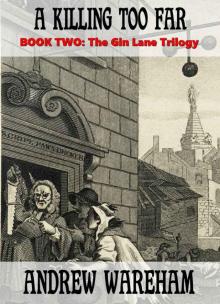 A Killing Too Far
A Killing Too Far Killing's Reward
Killing's Reward A New Place
A New Place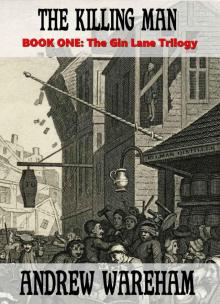 The Killing Man
The Killing Man Bold and Blooded
Bold and Blooded The Breaking Storm (Innocent No More Series, Book 2)
The Breaking Storm (Innocent No More Series, Book 2) Nobody’s Child
Nobody’s Child 04 Peking Nightmares (The Earl’s Other Son Series, #4)
04 Peking Nightmares (The Earl’s Other Son Series, #4) Red Man
Red Man Foreign Mud
Foreign Mud The Gathering Clouds (Innocent No More Series, Book 1)
The Gathering Clouds (Innocent No More Series, Book 1) 06 A Soldier’s Farewell (Man of Conflict #6)
06 A Soldier’s Farewell (Man of Conflict #6) Chinese Whispers
Chinese Whispers 02 Shanghai Dreams (The Earl’s Other Son #2)
02 Shanghai Dreams (The Earl’s Other Son #2) Hungry Harry: An Orphan in the Ranks
Hungry Harry: An Orphan in the Ranks A Wretched Victory (Innocents At War Series, Book 6)
A Wretched Victory (Innocents At War Series, Book 6) Illusions Of Change (A Poor Man at the Gate Series Book 6)
Illusions Of Change (A Poor Man at the Gate Series Book 6) The Wages Of Virtue (A Poor Man at the Gate Series, Book 8)
The Wages Of Virtue (A Poor Man at the Gate Series, Book 8) Blood and Famine (Man of Conflict Series, Book 4)
Blood and Famine (Man of Conflict Series, Book 4) The Friendly Sea (The Duty and Destiny Series, Book 1)
The Friendly Sea (The Duty and Destiny Series, Book 1) Bursting Balloons (Innocents At War Series, Book 5)
Bursting Balloons (Innocents At War Series, Book 5) The Death of Hope
The Death of Hope Deadly Shores (The Duty and Destiny Series, Book 11)
Deadly Shores (The Duty and Destiny Series, Book 11) The Vice Of Virtue (A Poor Man At The Gate Series Book 10)
The Vice Of Virtue (A Poor Man At The Gate Series Book 10) Virtue’s Reward (A Poor Man at the Gate Series, Book 11)
Virtue’s Reward (A Poor Man at the Gate Series, Book 11) A Deadly Caper (Innocents At War Series, Book 2)
A Deadly Caper (Innocents At War Series, Book 2)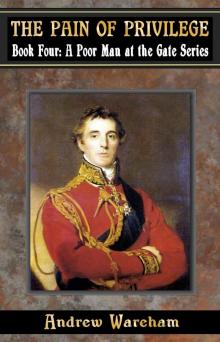 The Pain Of Privilege (A Poor Man at the Gate Series Book 4)
The Pain Of Privilege (A Poor Man at the Gate Series Book 4) Far Foreign (The Duty and Destiny Series, Book 9)
Far Foreign (The Duty and Destiny Series, Book 9) Shores of Barbary (The Duty and Destiny Series, Book 12)
Shores of Barbary (The Duty and Destiny Series, Book 12)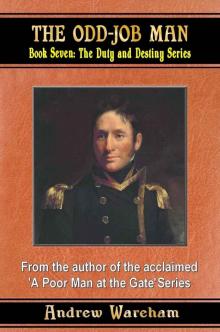 The Odd-Job Man (The Duty and Destiny Series, Book 7)
The Odd-Job Man (The Duty and Destiny Series, Book 7) Fire and Folly (Man of Conflict Series Book 3)
Fire and Folly (Man of Conflict Series Book 3) A Victorian Gent (The Making of a Man Series, Book 1)
A Victorian Gent (The Making of a Man Series, Book 1) Sugar and Spice (The Duty and Destiny Series, Book 6)
Sugar and Spice (The Duty and Destiny Series, Book 6) Dark Days Of Summer (Innocents At War Series, Book 4)
Dark Days Of Summer (Innocents At War Series, Book 4) Dire Shenanigans (The Making of a Man Series, Book 2)
Dire Shenanigans (The Making of a Man Series, Book 2) The Fuzzy-Wuzzy Man (The Duty and Destiny Series, Book 3)
The Fuzzy-Wuzzy Man (The Duty and Destiny Series, Book 3) Privilege Preserved (A Poor Man at the Gate Series Book 5)
Privilege Preserved (A Poor Man at the Gate Series Book 5) No Longer A Game (Innocents At War Series, Book 3)
No Longer A Game (Innocents At War Series, Book 3)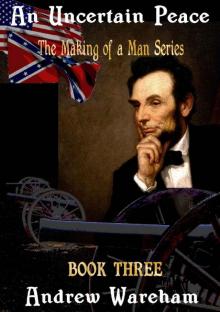 An Uncertain Peace (The Making of a Man Series, Book 3)
An Uncertain Peace (The Making of a Man Series, Book 3) Fortune And Glory (The Duty and Destiny Series, Book 5)
Fortune And Glory (The Duty and Destiny Series, Book 5) The Old Order (A Poor Man at the Gate Series Book 7)
The Old Order (A Poor Man at the Gate Series Book 7) A Place Called Home (Cannibal Country Trilogy, Book 2)
A Place Called Home (Cannibal Country Trilogy, Book 2) Nouveau Riche (A Poor Man at the Gate Series, Book 2)
Nouveau Riche (A Poor Man at the Gate Series, Book 2) The Privateersman (A Poor Man at the Gate Series Book 1)
The Privateersman (A Poor Man at the Gate Series Book 1) Britannia’s Son (The Duty and Destiny Series, Book 4)
Britannia’s Son (The Duty and Destiny Series, Book 4) Long Way Place (Cannibal Country Trilogy, Book 1)
Long Way Place (Cannibal Country Trilogy, Book 1) Spanish Tricks (Man of Conflict Series, Book 5)
Spanish Tricks (Man of Conflict Series, Book 5) A Parade Of Virtue (A Poor Man At The Gate Series Book 9)
A Parade Of Virtue (A Poor Man At The Gate Series Book 9) A Busy Season (The Duty and Destiny Series, Book 8)
A Busy Season (The Duty and Destiny Series, Book 8) Billy Bacon and the Soldier Slaves (Colonial Warrior Series, Book 1)
Billy Bacon and the Soldier Slaves (Colonial Warrior Series, Book 1) Raging Rajahs (Man of Conflict Series, Book 2)
Raging Rajahs (Man of Conflict Series, Book 2) Victorian Dawn (A Poor Man at the Gate Series, Book 12)
Victorian Dawn (A Poor Man at the Gate Series, Book 12) Born To Privilege (A Poor Man at the Gate Series Book 3)
Born To Privilege (A Poor Man at the Gate Series Book 3) The Soldier Brat (Man of Conflict Series, Book 1)
The Soldier Brat (Man of Conflict Series, Book 1)